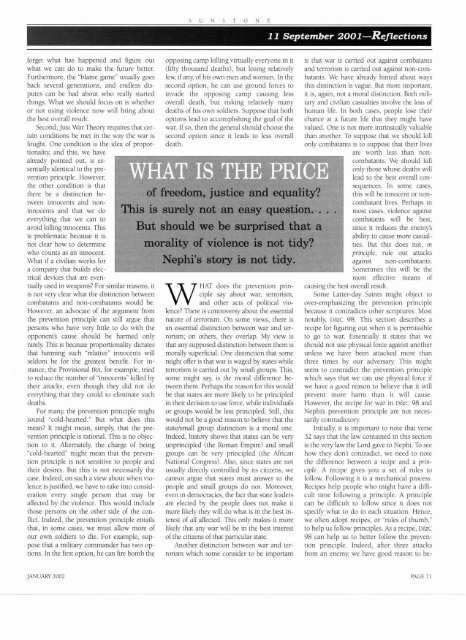Eugene England - Sunstone Magazine
Eugene England - Sunstone Magazine
Eugene England - Sunstone Magazine
Create successful ePaper yourself
Turn your PDF publications into a flip-book with our unique Google optimized e-Paper software.
forget what has happened and figure out opposing camp killing virtually everyone in it is that war is carried out against combatants<br />
what we can do to make the future better. (fifty thousand deaths), but losing relatively and terrorism is carried out against non-com-<br />
Furthermore, the "blame game" usually goes few, if any, of his own men and women. In the batants. We have already hinted about ways<br />
back several generations, and endless dis- second option, he can use ground forces to this distinction is vague. But more important,<br />
putes can be had about who really started invade the opposing camp causing less it is, again, not a moral distinction. ~ ith milithings.<br />
What we should focus on is whether overall death, but risking relatively many tary and civilian casualties involve the loss of<br />
or not using violence now will bring about deaths of his own soldiers. Suppose that both human life. In both cases, people lose their<br />
the best overall result. options lead to accomplishing the goal of the chance at a future life that they might have<br />
Second, Just War Theory requires that cer- war. If so, then the general should choose the valued. One is not more intrinsically valuable<br />
taln conditions be met in the way the war 1s second optlon slnce ~t leads to less overall than another To suppose that we should lull<br />
fought One condition is the ~dea of propor- death only combatants 1s to suppose that the~r hves<br />
t~onal~ty, and thls, we have<br />
are worth less than nonalready<br />
pointed out, is es-<br />
combatants We should kill<br />
sentially identical to the pre-<br />
only those whose deaths w11<br />
vention principle However,<br />
the other condition is that 1<br />
there be a distinction between<br />
innocents and noninnocents<br />
and that we do<br />
everything that we can to<br />
avoid killing innocents. This<br />
is problematic because it is<br />
not clear how to determine<br />
edom, d equ ality?<br />
rely n easy quesl<br />
~uld Y surpr ised t<br />
morality of vlole~ nce is not tidy?<br />
Nephi's story is not tidy.<br />
. .<br />
I<br />
lead to the best overall consequences.<br />
In some cases,<br />
this will be innocent or noncombatant<br />
lives. Perhaps in<br />
most cases, violence against<br />
combatants will be best,<br />
since it reduces the enemy's<br />
ability to cause more casualties.<br />
But this does not, in<br />
principle, rule out attacks<br />
who counts as an innocent.<br />
What if a civilian works for<br />
against non-combatants.<br />
a company that builds elec-<br />
Sometimes this will be the<br />
trical devices that are even-<br />
most effective means of<br />
tually used in weapons? For similar reasons, it<br />
W<br />
HAT does the prevention prin- causing the best overall result.<br />
is not very clear what the distinction between<br />
ciple say about war, terrorism, Some Latter-day Saints might object to<br />
combatants and non-combatants would be.<br />
and other acts of political vio- over-emphasizing the prevention principle<br />
However, an advocate of the argument from<br />
the prevention principle can still argue that<br />
persons who have very little to do with the<br />
opponent's cause should be harmed only<br />
rarely This is because proportionality dictates<br />
that harming such "relative" innocents will<br />
seldom be for the greatest benefit. For inlence?<br />
There is controversy about the essential<br />
nature of terrorism. On some views, there is<br />
an essential distinction between war and terrorism;<br />
on others, they overlap. My view is<br />
that any supposed distinction between them is<br />
morally superficial. One distinction that some<br />
might offer is that war is waged by states while<br />
because it contradicts other scriptures. Most<br />
notably, D&C 98. This section describes a<br />
recipe for figuring out when it is permissible<br />
to go to war. Essentially it states that we<br />
should not use physical force against another<br />
unless we have been attacked more than<br />
three times by our adversary. This might<br />
stance, the Provisional IRA, for example, tried terrorism is carried out by small groups. This, seem to contradict the prevention principle<br />
to reduce the number of "innocents" killed by some might say, is the moral difference be- which says that we can use physical force if<br />
their attacks, even though they did not do tween them. Perhaps the reason for this would we have a good reason to believe that it will<br />
everything that they could to eliminate such be that states are more likely to be principled prevent more harm than it will cause.<br />
deaths. in their decision to use force, while individuals However, the recipe for war in DQC 98 and<br />
For many, the prevention principle might or groups would be less principled. Still, this Nephi's prevention principle are not necessound<br />
"cold-hearted." But what does this would not be a good reason to believe that the sarily contradictory<br />
mean? It might mean, simply, that the pre- statdsmall group distinction is a moral one. Initially, it is important to note that verse<br />
vention principle is rational. This is no objec- Indeed, history shows that states can be very 32 says that the law contained in this section<br />
tion to it. Alternately, the charge of being unprincipled (the Roman Empire) and small is the very law the Lord gave to Nephi. To see<br />
"cold-hearted" might mean that the preven- groups can be very principled (the African how they don't contradict, we need to note<br />
tion principle is not sensitive to people and National Congress). Also, since states are not the difference between a recipe and a printheir<br />
desires. But this is not necessarily the usually directly controlled by its citizens, we ciple. A recipe gves you a set of rules to<br />
case. Indeed, on such a view about when vio- cannot argue that states must answer to the follow. Following it is a mechanical process.<br />
lence is justified, we have to take into consid- people and small groups do not. Moreover, Recipes help people who might have a diffieration<br />
every single person that may be even in democracies, the fact that state leaders cult time following a principle. A principle<br />
affected by the violence. This would include are elected by the people does not make it can be difficult to follow since it does not<br />
those persons on the other side of the con- more likely they will do-what is in the best in- specify what to do in each situation. Hence,<br />
flict. Indeed, the prevention principle entails terest of all affected. This only makes it more we often adopt recipes, or "rules of thumb,"<br />
that, in some cases, we must allow more of likely that any war will be in the best interest to help us follow principles. As a recipe, DQC<br />
our own soldiers to die. For example, sup- of the citizens of that particular state. 98 can help us to better follow the prevenpose<br />
that a military commander has two op- Another distinction between war and ter- tion principle. Indeed, after three attacks<br />
tions. In the first option, he can fire bomb the rorism which some consider to be important from an enemy, we have good reason to be-<br />
JANUARY 2002 PAGE 7 1

















